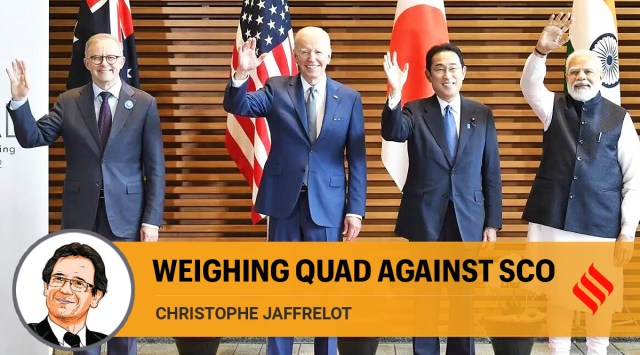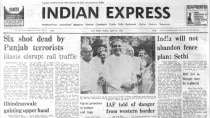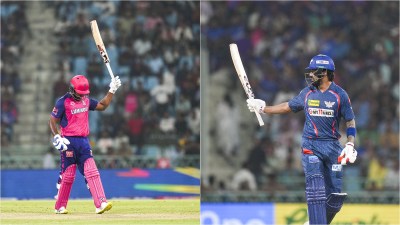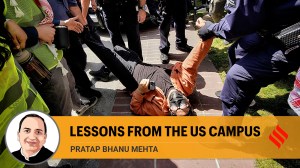- India
- International
Christophe Jaffrelot writes: Weighing Quad against SCO
India may give up its strategic balancing of China and West if the Ukraine war weakens Russia and Moscow is unable to provide for its defence needs.
 Australian PM Anthony Albanese, US President Joe Biden, Japan PM Fumio Kishida and PM Narendra Modi at Quad Summit in Tokyo, Japan. (Twitter/MEA/File)
Australian PM Anthony Albanese, US President Joe Biden, Japan PM Fumio Kishida and PM Narendra Modi at Quad Summit in Tokyo, Japan. (Twitter/MEA/File)When the Ukraine crisis began, Indian observers and officials pointed out that New Delhi would prefer not to take sides partly because its priority was elsewhere — China. Today, in the context of the SCO meeting, this decoupling appears difficult to sustain.
The Chinese threat has been largely responsible in shaping New Delhi’s Indo-Pacific policy. India’s growing apprehensions had become palpable after the launch of the Belt and Road Initiative and the growing presence of China in India’s neighbourhood — as evident from China’s investments not only in Pakistan and Myanmar but also in Nepal and Sri Lanka. In this context, India felt encircled.
Prime Minister Narendra Modi shared his vision of the Indo-Pacific for the first time on June 1, 2018, at the Shangri-La Dialogue in Singapore where he claimed that the Indo-Pacific “include[d] all nations in this geography as also others beyond who have a stake in it”, an oblique reference to the Western powers who till recently were not welcome by India in its region. The launch of the Quad, a year earlier, was clearly a reaction to China’s assertiveness in the region.
At the same time, India was not comfortable with the anti-Chinese stand of the Americans — the ambivalence was a result of the desire not to alienate the country’s big neighbour. In fact, India agreed to upgrade the Quad meetings at the ministerial level — something the US was longing for — only after the Galwan attack in which 20 Indian soldiers were killed in 2020.
While the India-US rapprochement in the Indo-Pacific seemed to be more necessary than ever vis-à-vis China, India continued to believe in plurilateralism, a doctrine elucidated by External Affairs Minister S Jaishankar in his 2020 book, The Indian Way: “If India drove the revived Quad arrangement, it also took membership of the Shanghai Cooperation Organisation. A longstanding trilateral with Russia and China now coexists with one involving the US and Japan”. The idea, here, is to “engage competing powers like the US, China, the EU or Russia at the same time”. India stands in favour of a multipolar world where the plurality of power centres would allow her to play one pole against the other. In this context, New Delhi wants Russia to remain an important player — but this is not the only reason.

This stand goes together with India’s reservations against the West’s past hegemony and the international order that got established after 1945. In his book, Jaishankar points out that the West never really understood India and has been “historically so dismissive of our society.” He also emphasises the fact that the West has imposed on the world norms that need to be dismantled: “The key of Western durability till now is the set of institutions and practices that it progressively but firmly established in the period of its dominance. … These are supported by narratives that serve the West well, while diminishing its competitors. The mix of institutions, regimes, regulations and understandings is such a complex web that creating alternatives is truly a formidable challenge. However, as global power redistribution progresses, this will inevitably happen”. This discourse explains why India has joined the Indo-Pacific Economic Framework reluctantly (and partially) — this is again a norms-based partnership which should establish standards in key domains, including the digital economy.
To get rid of the multilateral institutions shaped by the West in 1945 — or to control them — is also the objective of India’s BRICS partners. Jaishankar, incidentally, looks at China as a model for this very reason — “as the first non-Western power to seriously rise in the post-1945 era, [that] has drawn on its cultural heritage to project its responsibility and shape the narrative. It is but logical that India too should follow suit”. But of course, Russia is undermining the world order inherited from western domination even more effectively.
Russia matters to India for two other reasons. First, India cannot free itself from Russian dependence in terms of military equipment — when more than two-thirds of its weapons come from Russia (or have been conceived in Russia), including sophisticated ones like the S-400. But overcoming this dependence may be on India’s agenda if, true to its plurilateral doctrine, it aims mostly at diversifying its supply. Second, New Delhi is keen to remain a partner of Russia to balance China — isolated, Moscow may be tempted to get even closer to China.
These factors explain why India took part in the recent Vostok military drill, along with Azerbaijan, Algeria, Armenia, Belarus, Kazakhstan, Kyrgyzstan, China, Laos, Mongolia, Nicaragua, Syria and Tajikistan. Its participation was not well received in the US, but it’s in tune with New Delhi’s strategy, where it is probably believed that the West needs India so much that the country will get away with it.
But does the West need India more than India needs the West? The response to this question will be overdetermined by two variables. First, Western sanctions weaken Russian sanctions to such an extent that Moscow not only turns to Beijing but also fails to deliver some of the weapons India needs. And if Russia fails to win the Ukraine war, this pole will be so low that China will be the only non-western power that will matter. Second, China’s policy vis-à-vis India will also matter. This summer, while New Delhi had immediately come to the rescue of Colombo by offering some financial help after Sri Lanka got almost bankrupt, its pressure could not prevent its neighbour from welcoming a Chinese surveillance ship at the Hambantota port. If China continues to put this kind of pressure on India, New Delhi may need the Quad more than some of the SCO countries.
The writer is senior research fellow at CERI-Sciences Po/CNRS, Paris, professor of Indian Politics and Sociology at King’s India Institute, London, and non-resident scholar at the Carnegie Endowment for International Peace
EXPRESS OPINION
Best of Express

More Explained
Apr 28: Latest News
- 01
- 02
- 03
- 04
- 05










































